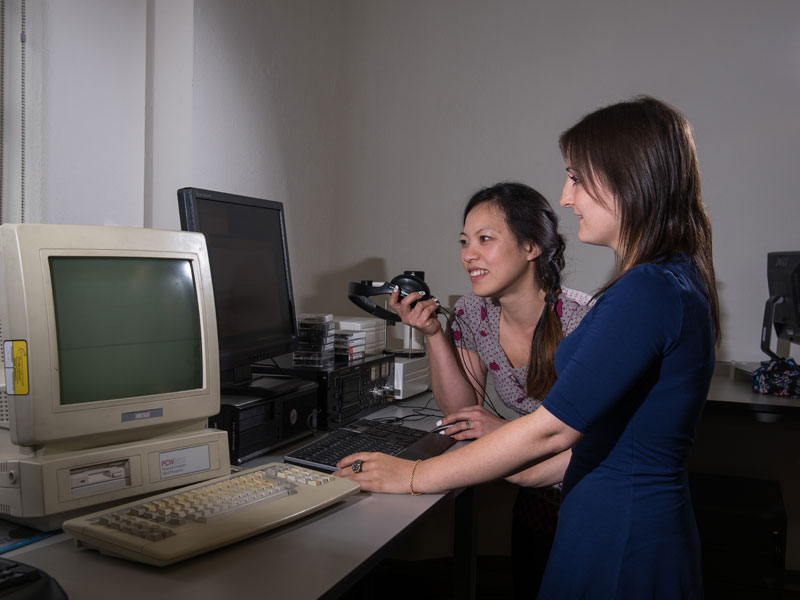Founded in 1602, Oxford’s Bodleian Library is one of the oldest libraries in Europe. A new initiative is ensuring that the Bodleian is looking to the future: with the support of the Heritage Lottery Fund, the library is training six digital archivists.
Incredible amounts of digital information are now produced every day – from emails to social media. However, the libraries and archiving sector needs to keep pace with the digital revolution, and skills in digital archiving are not yet widespread. This means that a vast quantity of content created digitally and with lasting cultural, scientific and historic relevance, remains inaccessible.

With a gift of £292,000 from the Heritage Lottery Fund, through their Skills for the Future programme, the Bodleian is helping to close this skills gap by training six graduates over the next five years to become archivists with specific expertise in digital archiving. ‘The historical record is changing radically with the widespread adoption of digital technologies’ says Richard Ovenden, Bodley’s Librarian. ‘The Bodleian is serious about its role as a steward of vital information about the past for the benefit of the future. The skills that these archivists will learn, and the work they will undertake on our own collections will be vital for us as we adapt our working methods to fit the new forms of historical records.’
There is an urgent need for specialist digital archivists in all fields, starting with the sciences. ‘In scientific research, you don’t get reams of notebooks anymore, you get floppy disks and laptops,’ says Emily Chen, one of two trainees currently at the Bodleian, who started in September last year. ‘Any research group today will be working with people around the world, and emails will be the way they are exchanging information and data, so that is what you want to preserve. A scientific paper and its findings are useless without the research behind it, because you can’t replicate it.’
Digital materials are now also at the centre of literature, history and art. Just as a researcher can request to look through the papers of writer Alan Bennett; in the near future, a scholar will be able to look through a virtual copy of an author’s laptop. Currently waiting to be processed at the Bodleian are digital materials from journalist Anthony Sampson, who was a close friend of Nelson Mandela, and from medical geneticists Sir Walter and Lady Julia Bodmer.
From convincing people to setting standards
Both traditional and digital archiving aim to preserve materials and to make them accessible, but the latter requires a lot of groundwork before any materials are actually stored. ‘A large part of working in digital archiving is making people aware that it is a possibility, and convincing them to give us their materials,’ says Harriet Costelloe, another trainee at the Bodleian.
Once someone has agreed to do this, there needs to be a constant dialogue with the creator, to make sure the format of the material does not become obsolete, or to decide whether previous versions of materials are kept. ‘With digital archiving, the process starts when the file is created, rather than at the end of the material’s lifecycle, which is what tends to happen with physical materials,’ says Harriet.
Setting standards for saving emails, images and documents is a key part of archiving, but it is difficult in an environment that changes daily. ‘Processes, ideas and standards are always in transition because technology evolves so quickly,’ explains Harriet. Regardless of what progress the future holds, the crucial job now is to store the material comprehensively, so nothing is lost because it has been deleted or physically destroyed. ‘The way of presenting and cataloguing these materials will probably change in the next decade, but the most important thing right now is to preserve this material so that, in ten years, we have something to work with,’ adds Emily.
A unique opportunity
Working in this rapidly changing environment makes this traineeship different from many others. ‘There is always something new to do, something that no one has attempted to follow through before. It’s not like someone is teaching us how to do it, we are learning from each other and everybody is learning,’ says Emily.
‘This is a fairly unique traineeship,’ says Harriet. ‘There are rarely opportunities for training on the job and financial support to obtain archiving qualifications, so the fact that six people will be getting that is great.’
The impact of the traineeship goes beyond providing qualifications for young professionals like Harriet and Emily. It is not only paving the way for how the Bodleian Libraries will manage its digital archiving in the future, but is already contributing to research in the field. ‘Through our traineeships we will be able to seed the archival community with inpiduals who both have a theoretical grasp of the issues, and have ‘learned-through-doing’ in a very practical way,’ says Richard. ‘This will help other libraries and archives in the future.’
The historic and cultural impact of digital archiving is also immense. Since recent legislation has enabled legal deposit libraries like the Bodleian and the British Library to archive UK websites, these institutions have been working to capture important news events, from the Olympics to the Scottish Referendum. Harriet and Emily recently led the archiving of the Ebola response in the UK. ‘We trawled the web for articles and posts on Ebola, to capture the response to the crisis, for posterity,’ says Harriet.
With the amount of digital information only set to increase, developing the necessary skills for the archivists of the future is a vital step forward in preserving records that would otherwise be buried.
The Bodleian Libraries are now seeking matched funding for this programme.